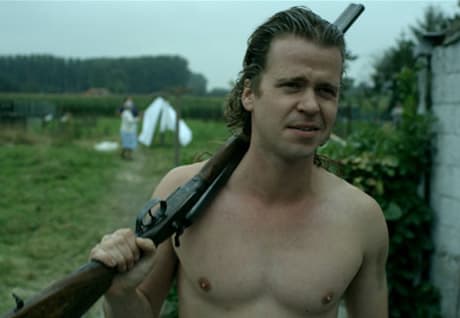When Gunther, an aimless young wannabe novelist, accidentally gets his girlfriend pregnant, he starts reflecting on his childhood in a small, poor Flemish community where he was conceived under similarly unhappy circumstances by one Marcel "Celle" Strobbe (Koen De Graeve), the type of bar patron you wouldn't necessarily want as your father. Nine months after conceiving little Gunther against the wall behind a favourite bar, we see Marcel returning to said establishment with baby in hand, proudly ordering the house a celebratory round of drinks. That the baby falls out of its basket face-first onto the bar counter seems of only mild concern to everyone assembled.
Gunther is technically the protagonist, but this passive, quiet kid is more of an audience surrogate than a flesh-and-blood character. The film really belongs to Koen De Graeve as the disorderly, perma-drunk father, a man who looks like he was carved haphazardly out of a block of wood. De Graeve is good during the low comedy shenanigans and scenery-chewing emotional moments, but more interestingly, watch him during a key conversation with Gunther towards the end of the film; it's subtle, powerful acting.
What really makes the film work is its grimy, greasy atmosphere; you can practically smell the sweaty hair, spilled beer and poorly maintained outhouses in this glum little town. The bars are dingy and undecorated, save for the notices plastered all over the walls, while the Strobbe apartment is defined by flaking wallpaper, ugly tiles and sickly amber light. Cinematographer Ruben Impens works mostly with natural light, a wise decision.
This is not exactly revolutionary material ― as a flashback-heavy story of a boy's tumultuous relationship with his father, family and hometown, the tale hits most of the expected notes. Still, while the notes may be familiar, the music has a compellingly bawdy and greasy aura.
(Evokative)Gunther is technically the protagonist, but this passive, quiet kid is more of an audience surrogate than a flesh-and-blood character. The film really belongs to Koen De Graeve as the disorderly, perma-drunk father, a man who looks like he was carved haphazardly out of a block of wood. De Graeve is good during the low comedy shenanigans and scenery-chewing emotional moments, but more interestingly, watch him during a key conversation with Gunther towards the end of the film; it's subtle, powerful acting.
What really makes the film work is its grimy, greasy atmosphere; you can practically smell the sweaty hair, spilled beer and poorly maintained outhouses in this glum little town. The bars are dingy and undecorated, save for the notices plastered all over the walls, while the Strobbe apartment is defined by flaking wallpaper, ugly tiles and sickly amber light. Cinematographer Ruben Impens works mostly with natural light, a wise decision.
This is not exactly revolutionary material ― as a flashback-heavy story of a boy's tumultuous relationship with his father, family and hometown, the tale hits most of the expected notes. Still, while the notes may be familiar, the music has a compellingly bawdy and greasy aura.
